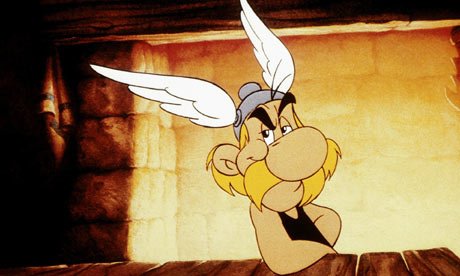
This month marks the 50th birthday of France's most popular comic book. Back in October 1959, writer René Goscinny and illustrator Albert Uderzo had their first comic strip published in the magazine Pilote. The comic featured Asterix and Obelix, two inseparable and delightfully complementary characters from a small village in Brittany renowned for "sticking it to the man" by resisting Caesar's colonial ambitions. Asterix and Obelix's adventures did suffer from some ups and down along the way, most notably after Goscinny's death in 1977, but their popularity never did fade: the comic books sold more than 325m copies worldwide and have been translated into 107 languages.
Reading the many articles attempting an analysis of our little Gaulois' success story in the British and American press, it seems that Asterix became, to its many international adult readers, an emblem of the rebellious and somehow undisciplined character of the French. A small village is being relentlessly attacked by an impossible and uncrushable force, and yet its spirit will not be crushed.
The storyline draws many parallels from last century's postwar developments, in which France changed rapidly and drastically as it lost its colonies, went through important periods of social unrest, adopted globalisation and finally joined forces with other European countries, jumping headfirst in the economic waves of capitalism in a bid to modernise the union. In the light of France's abdication to free market rules, one could be excused for thinking Asterix's message a bit passé: cultural hegemony is stronger and more threatening by the day. Fewer people than ever are speaking or learning French, and what used to make France remarkable, from artisan food to carefully crafted wines, is quietly brushed away to make room for the next generation of international chefs. In other words, France may fear its cultural identity is at stake, but it has effectively already capitulated to bigger forces long ago.
I don't doubt that many adults find Asterix's adventures likeable for those very reasons: there's something endearing about the French and their illusions de grandeur, in which they like to think of themselves as the underdogs putting up a righteous fight for the survival of their perceived uniqueness. I fear the French are too often guilty of clinging to obsolete historical landmarks, most of which paint a picture of their country as having an important and respected say in world culture – from international diplomacy to food, fashion and art. This is a vestige of the past, and yet Asterix charmingly perpetuates this comfortable illusion of control for many a French reader: they're depicted as feisty, fun-loving patriots with a culture and spirit of résistance that can't be obliterated, even under duress.
But perhaps looking at Asterix through a politico-cultural prism is to do it a disservice. I for one was much too young a reader to ponder the books' hidden metaphors, but still enjoyed the series immensely (that is, up until Goscinny's death – the following books, written by Uderzo, were sadly not up to their old standards). Asterix followed me through my childhood, and the comic books could be found in almost every room in my house, from the toilet to the living room, in which I also had Asterix's adventures on video (I also pestered my mother to take me to the Asterix theme park near Paris, but my pleas never worked). As a kid, I liked the plots' simplicity and took pleasure in seeing clueless Romans being beaten every time.
Fifteen years later, I enjoy the comic books in a different, perhaps more cautious way. I still marvel at the play on words and caustic wit, and reading the English translation is surprisingly enjoyable – many even claim it is better than the French original. Comparing characters' names and other details makes for an entertaining pastime. I do raise an eyebrow or two at the blatant chauvinism and racist undertones (although as far as racist stereotypes are concerned, Asterix is way less blatantly offensive than its Belgian competitor, Tintin). I will admit to having no patience for the fantastically popular recent movie adaptations (in which national treasure Gérard Depardieu plays Obelix with gusto). But if anything, it proves the Asterix brand is doing extremely well in its native country – the most recent film, Asterix at the Olympic Games, grossed $23.4m in France in its opening weekend (it also says a lot of the French's insatiable taste for mediocre nationalist movies).
That said, perhaps Asterix is best left to children. We adults always tend to ruin good fun by analysing it too much.

